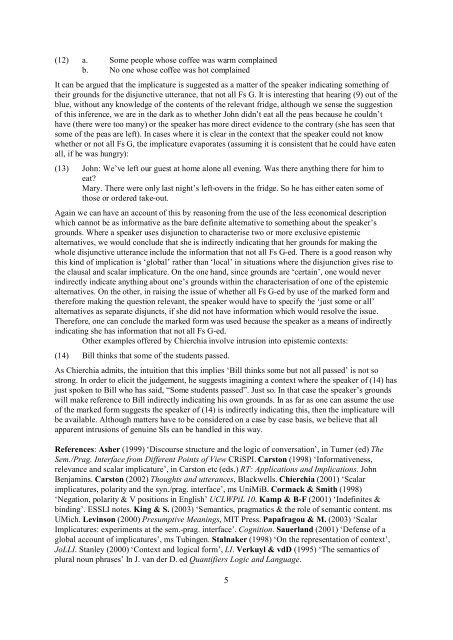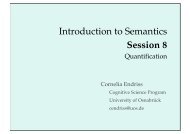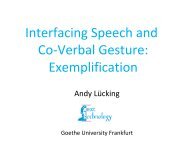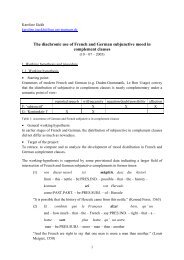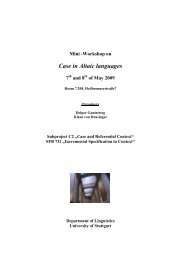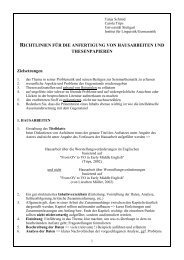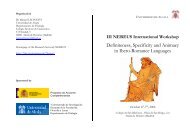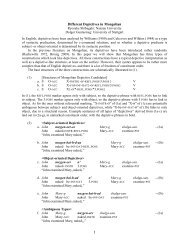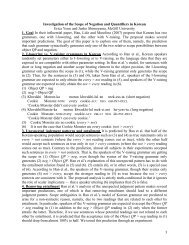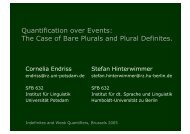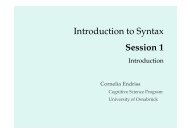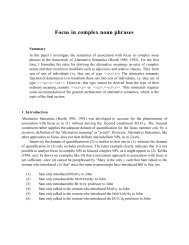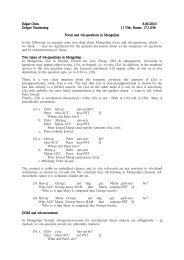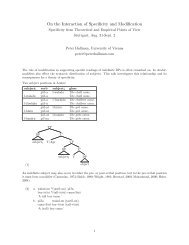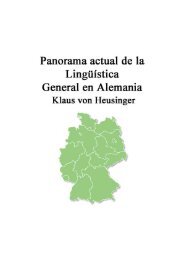SemPrag03.Progr.pdf - Institut für Linguistik/Germanistik - Universität ...
SemPrag03.Progr.pdf - Institut für Linguistik/Germanistik - Universität ...
SemPrag03.Progr.pdf - Institut für Linguistik/Germanistik - Universität ...
Create successful ePaper yourself
Turn your PDF publications into a flip-book with our unique Google optimized e-Paper software.
(12) a. Some people whose coffee was warm complained<br />
b. No one whose coffee was hot complained<br />
It can be argued that the implicature is suggested as a matter of the speaker indicating something of<br />
their grounds for the disjunctive utterance, that not all Fs G. It is interesting that hearing (9) out of the<br />
blue, without any knowledge of the contents of the relevant fridge, although we sense the suggestion<br />
of this inference, we are in the dark as to whether John didn’t eat all the peas because he couldn’t<br />
have (there were too many) or the speaker has more direct evidence to the contrary (she has seen that<br />
some of the peas are left). In cases where it is clear in the context that the speaker could not know<br />
whether or not all Fs G, the implicature evaporates (assuming it is consistent that he could have eaten<br />
all, if he was hungry):<br />
(13) John: We’ve left our guest at home alone all evening. Was there anything there for him to<br />
eat?<br />
Mary. There were only last night’s left-overs in the fridge. So he has either eaten some of<br />
those or ordered take-out.<br />
Again we can have an account of this by reasoning from the use of the less economical description<br />
which cannot be as informative as the bare definite alternative to something about the speaker’s<br />
grounds. Where a speaker uses disjunction to characterise two or more exclusive epistemic<br />
alternatives, we would conclude that she is indirectly indicating that her grounds for making the<br />
whole disjunctive utterance include the information that not all Fs G-ed. There is a good reason why<br />
this kind of implication is ‘global’ rather than ‘local’ in situations where the disjunction gives rise to<br />
the clausal and scalar implicature. On the one hand, since grounds are ‘certain’, one would never<br />
indirectly indicate anything about one’s grounds within the characterisation of one of the epistemic<br />
alternatives. On the other, in raising the issue of whether all Fs G-ed by use of the marked form and<br />
therefore making the question relevant, the speaker would have to specify the ‘just some or all’<br />
alternatives as separate disjuncts, if she did not have information which would resolve the issue.<br />
Therefore, one can conclude the marked form was used because the speaker as a means of indirectly<br />
indicating she has information that not all Fs G-ed.<br />
Other examples offered by Chierchia involve intrusion into epistemic contexts:<br />
(14) Bill thinks that some of the students passed.<br />
As Chierchia admits, the intuition that this implies ‘Bill thinks some but not all passed’ is not so<br />
strong. In order to elicit the judgement, he suggests imagining a context where the speaker of (14) has<br />
just spoken to Bill who has said, “Some students passed”. Just so. In that case the speaker’s grounds<br />
will make reference to Bill indirectly indicating his own grounds. In as far as one can assume the use<br />
of the marked form suggests the speaker of (14) is indirectly indicating this, then the implicature will<br />
be available. Although matters have to be considered on a case by case basis, we believe that all<br />
apparent intrusions of genuine SIs can be handled in this way.<br />
References: Asher (1999) ‘Discourse structure and the logic of conversation’, in Turner (ed) The<br />
Sem./Prag. Interface from Different Points of View CRiSPI. Carston (1998) ‘Informativeness,<br />
relevance and scalar implicature’, in Carston etc (eds.) RT: Applications and Implications. John<br />
Benjamins. Carston (2002) Thoughts and utterances, Blackwells. Chierchia (2001) ‘Scalar<br />
implicatures, polarity and the syn./prag. interface’, ms UniMiB. Cormack & Smith (1998)<br />
‘Negation, polarity & V positions in English’ UCLWPiL 10. Kamp & B-F (2001) ‘Indefinites &<br />
binding’. ESSLI notes. King & S. (2003) ‘Semantics, pragmatics & the role of semantic content. ms<br />
UMich. Levinson (2000) Presumptive Meanings, MIT Press. Papafragou & M. (2003) ‘Scalar<br />
Implicatures: experiments at the sem.-prag. interface’. Cognition. Sauerland (2001) ‘Defense of a<br />
global account of implicatures’, ms Tubingen. Stalnaker (1998) ‘On the representation of context’,<br />
JoLLI. Stanley (2000) ‘Context and logical form’, LI. Verkuyl & vdD (1995) ‘The semantics of<br />
plural noun phrases’ In J. van der D. ed Quantifiers Logic and Language.<br />
5


